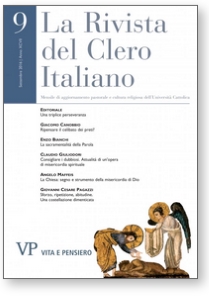|
Celibacy For Priests. The Defense Takes the Floor
By Sandro Magister
Chiesa
October 24, 2016
http://chiesa.espresso.repubblica.it/articolo/1351395?eng=y
 |
It will not be discussed at a synod, but pressure is growing in favor of the ordination of married men. The most highly esteemed of the Italian theologians has puts a spotlight on the question in an authoritative magazine. And he is opting to hold on to celibacy: not only “opportune,” but “necessary”ROME, October 24, 2016 – Interviewed a few days ago by Gianni Cardinale for the newspaper of the Italian episcopal conference, “Avvenire,” the secretary general of the synod of bishops, Cardinal Lorenzo Baldisseri, confirmed that the theme chosen by Pope Francis for the new session in 2018 - “Young people, faith, and vocational discernment” - was the same one that the fourteen cardinals and bishops of the synodal secretariat had put on the top of the list of their proposals.
But Baldisseri also said that just after it, on the list, were the ordained ministries. Without specifying further but with the obvious, implied question of the ordination of married men.
Already once before, in 1971, a synod had addressed this issue. And many voices had been raised in favor of the ordination of “viri probati,” meaning “married men of mature age and of established probity.” That request was put to a vote and defeated only narrowly by the opposing side: 107 against 87.
And once again today there are insistent, widespread requests to introduce a married clergy into the Latin Church on a larger scale, with Pope Francis having made it clear on several occasions that he is ready to listen:
> The Next Synod Is Already in the Works. On Married Priests (9.12.2015)
> Married Priests. The Germany-Brazil Axis (12.1.2016)
> Not Enough Celibate Priests? Make Way For Married Priests (21.9.2016)
But in point of fact it will not be the next synod that takes into consideration the ordination of married men. According to what Baldisseri has confided to the council of the secretariat of the synod, Francis, who was responsible for making the choice, ultimately appears to have preferred to drop this issue and fall back on the more innocuous issue of young people, in part to keep from adding a new intraecclesial conflict to the still dramatic one ignited by the previous synod and by the post-synodal exhortation “Amoris Laetitia.”
*
This does not change the fact that the question of the ordination of married men remains on the agenda, in the Church. And Francis will certainly not drop it.
It has been brought into focus recently with rare clarity by one of the most highly esteemed theologians, Giacomo Canobbio, professor of systematic theology at the Theological Faculty of Milan and former president of the Association of Italian Theologians, in an article in the influential and authoritative “Journal of the Italian Clergy,” published by the Catholic University of Milan and run by three prominent bishops: Franco Giulio Brambilla, Gianni Ambrosio, and Claudio Giuliodori.
The article is entitled: “Rethink the celibacy of priests?”
And it begins by emphasizing that recently such a rethinking has also been recognized as “legitimate” by the cardinal secretary of state, Pietro Parolin, in a talk last February at the Pontifical Gregorian University.
But the rethinking to which Canobbio dedicates himself by no means follows the beaten path. It dismantles commonplaces and leads the reader to conclusions that are to a large extent unconventional.
To begin with, Canobbio clears the field of the illusion that a married clergy is the remedy for the decline in vocations to the priesthood. It is enough to look, he writes, at what is happening among the Orthodox and the Protestants, where priests and pastors are married but vocations are in crisis all the same. This crisis, in fact, “stems from dechristianization, not from the link between the ordained ministry and celibacy.”
“The question nonetheless remains,” Canobbio continues. And he asks: “In a context of dechristianization, what meaning can the celibacy of priests take on when it comes to evangelization?” Since this connection does not belong to the fundamental contents of the faith, “could it be conjectured that, given the urgency of the mission that Francis is constantly recalling, it may be opportune to attenuate the obligation of celibacy?”
In the initial part of the article, Canobbio examines how historically celibacy has been conjoined with the ordained ministry, in the Latin Church: first on the practical terrain and secondarily for reasons of a mystical and Christological character, to the point of considering the celibate priest as he who operates “in persona Christi,” in total dedication to him and to men, in the Church.
And he comments:
“The ecclesiological dimension of the relationship between ordained ministry and celibacy therefore cannot be superficially set aside. We are children of history (and of the reflection that flows from it) and we cannot imagine what we would be if this had unfolded in a different form. In fact, celibacy for the Kingdom of Heaven has shaped not only the life of presbyters, but also the general arrangement of the Latin Church, and it must be taken into account that a different form of ordained ministry would involve a general rearrangement of the life of the same Church. The legitimacy of such a rearrangement is a priori outside of the discussion: history has known many of these. We should nonetheless ask if full-time dedication to the ministry would not suffer some limitations if the presbyter had to provide for the necessary care of his family, and as a result if the Christian community could have recourse to its presbytery with the freedom that now, at least theoretically, it maintains it should rightly have.”
After which he addresses the question head-on. But now let’s give the author the floor, presenting the essential passages of his text.
|
